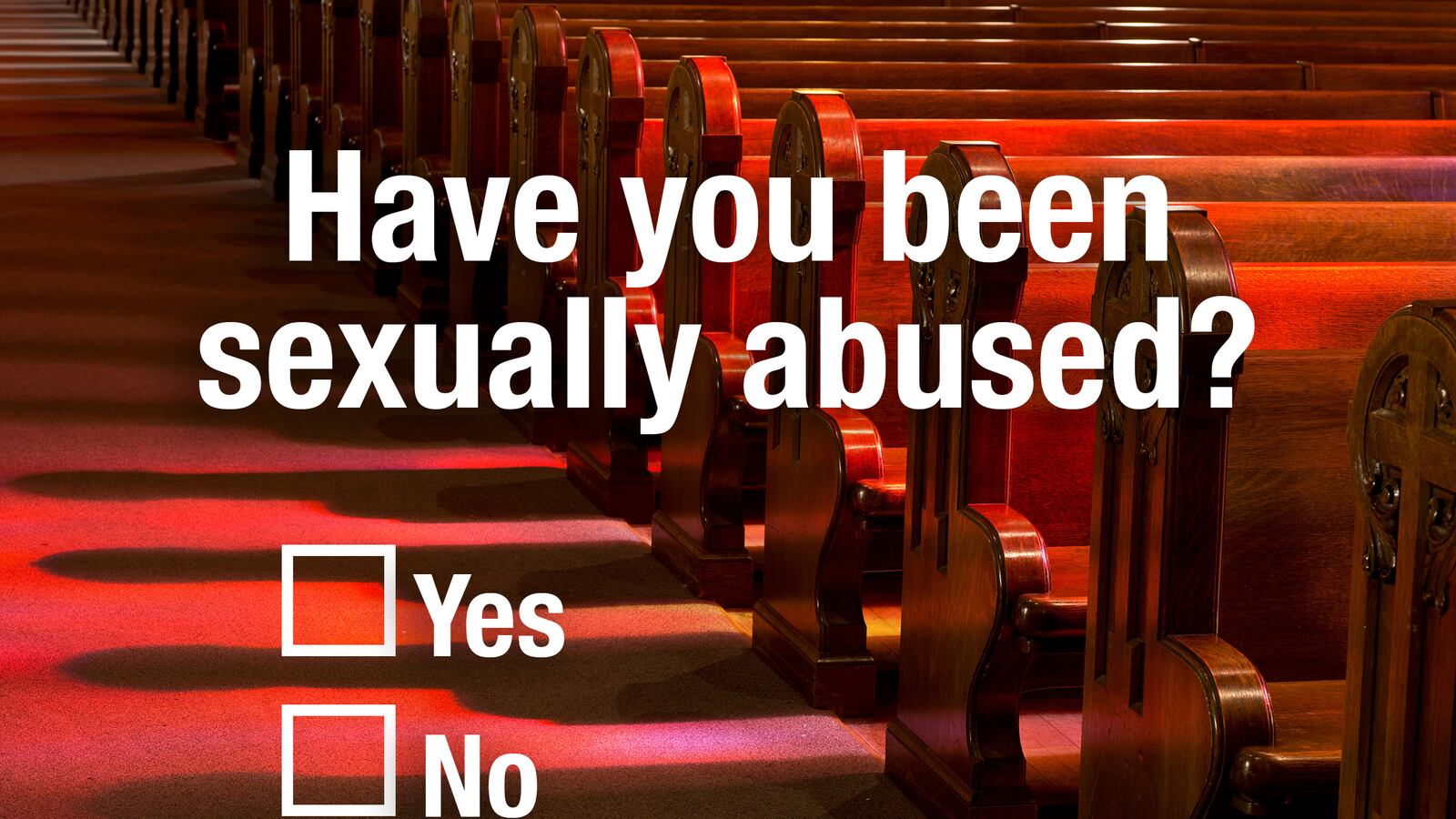If you want to work for the Twin Cities Bible Church, you will have to disclose whether you were raped as a child.
“Have you ever been physically or sexually abused as a child?” is one of the questions on the Urbana, Illinois, church’s job application. “If yes, when, where, and what were the circumstances?”
The questions are shocking, but not rare for Protestant churches and religious organizations across the United States. These groups want to know the personal histories of prospective employees in an attempt to protect themselves against liability for potential sex-abuse scandals based on the false belief that victims of sex abuse as children are destined to become abusers as adults.
Hundreds of churches, including The National Community Church (PDF) in Washington, D.C., the Shalom Mennonite Fellowship in Arizona, Nazarene Churches (PDF) in Ohio, and Church on the Rock (PDF) in Missouri all ask applicants some variation on: “Were you a victim of abuse or molestation while a minor?”
Even potential janitors at Trinity Preschool in Texas are asked this question (PDF).
The Faith Assembly of God in New York mentions that, “answering yes, or leaving the question unanswered, may not automatically disqualify an applicant for youth or children’s work.”
Ferris Hill Baptist Church of Florida says, “Individuals who have such a history [of sexual abuse as a minor] should discuss their desire to work with preschoolers, children or youth with one of the pastoral staff prior to engaging in any volunteer service” (PDF). Park Row Christian Academy, in Arlington, Texas, asks abuse victims if they are willing to use “church resources to seek healing in this area of your life?”
Some ministries don’t stop at past sexual abuse.
The Ark-La-Tx Crisis Pregnancy Center, an anti-abortion clinic in Bossier, Louisiana, also evaluates applicants on their “submission to authority,” and asks them, “When do you feel sexual intercourse is morally permissible?” (PDF)
Houston megachurch Lakewood asks volunteers: “Have you ever been involved in a cult or the occult (witchcraft, satanism, psychics, horoscopes, etc)?”
The National Black Home Educators organization recommends local chapters vet officers by asking them, “Have you indulged in any form of pornography in the past 2 years? If so, please explain.”
The Trail Life troop, a Christian leadership program for young men at Grace Covenant Church in North Carolina, asks employees: “Have you ever been convicted of, accused of or practiced homosexuality?” (PDF)
While the Catholic Church is known for its scandals (with 3,400 reported to the Vatican between 2004 and 2014), Protestant churches have been struggling with their own sins. The decentralized nature of Protestant churches helps keep individual scandals from going national, unless they involve outsized figures like Josh Duggar (the ex-reality TV star who admitted to molesting his siblings and neighbors) and evangelical minister Bill Gothard, who resigned from his ministry amid accusations he harassed or molested dozens of his followers.
Despite the lack of public attention paid to Protestant sex abuse, church insurance companies took notice.
“It is very significant to observe that a number of church insurance companies are reducing significantly the insurance coverage they provide for child abuse or molestation, and in some cases are excluding it entirely,” Richard Hammar, the senior editor of Christianity Today’s Church Law and Tax Review, wrote in Ministry Magazine, in January 1991.
Hammar put a question about childhood molestation in a sample employment application included in his book, Reducing the Risk of Child Sexual Abuse in Your Church.
“I included this question on the form because of a ruling by the Alaska Supreme Court in 1991 (just months before the kit was published) finding that a church was responsible for the molestation of a young child because it failed to ask the molester (a nursery worker) whether or not she had been molested as a child,” Hammar wrote in a blog post. (He did not respond to a request for comment.)
In Broderick v. King’s Way Assembly of God, justices found the church liable for sexual abuse by employee Shirley Gilman, who had been abused as a child.
“King’s Way did not interview Gilman or conduct a background check,” the court’s decision read. “Nor has it offered any evidence that Gilman’s past sexual abuse did not affect her competency,” meaning that the court believed Gilman’s abuse could have caused her to abuse children. To support that opinion, the court also quoted a 1989 study on sexual abuse, saying, “being sexually victimized as a child is a common experience for adult sex offenders.”
By 1998, Hammar’s questionnaire was included in sample volunteer application forms (PDF) made by Lifeway Christian Stores, a major Baptist bookstore chain. That year, Lifeway’s representative for its Bible studies division told the Baptist Press: “All people who have been abused do not become child abusers, but almost all child abusers have been abused themselves.”
This is not true, though. As a 2001 study in the British Journal of Psychiatry found, “The data supports the notion of a victim-to-victimiser cycle in a minority of male perpetrators, but not among the female victims studied.”
And according to the author of the 1989 study cited by the Alaska Supreme Court, justices and churches are misusing her work.
“That is a very old paper and based upon a clinical sample that came to our program at the University of Michigan and all were intrafamilial sexual-abuse cases,” Professor Kathleen Faller told The Daily Beast. “Therefore, the sample is not relevant to clergy cases.
“Moreover, since most offenders are men and most victims are women, the hypothesis that a major contributing factor to sex offending is a history of sexual abuse does not make sense.”
Again, the sex abuse questions are liability, not science. Anna Bryant, a public affairs officer with State Farm Insurance, told The Daily Beast she could find nothing in their policies that would recommend churches to ask about past sexual abuse. (Bryant also said church insurance is “not a big line of business for us.”)
Insurance agencies that specialize in covering churches were less cooperative. One company, Church Mutual, refused to comment, calling its recommendations “proprietary.” Several other companies, including GuideOne, GuideStone, and Brotherhood Mutual. would not comment. Still, these companies produce publicly available materials on preventing sexual abuse and nothing in these materials suggest that churches should ask whether people had been abused as children.
The sex-abuse questions are likely legal because churches are not totally bound by non-discrimination laws.
“Under the ministerial exemption, religious institutions are allowed to violate employment-discrimination law when hiring and firing their ministers,” said Greg Lipper, a lawyer for Americans United for Separation of Church and State. “Not everyone who works for a church is a minister, but the exception applies to employees with significant religious responsibilities, including clergy and religious-school teachers.” So asking the janitor about their past abuse might be prohibited, but asking the Sunday School teacher is fair game.
Legal or not, it’s wrong to force abuse victims to relive the trauma in job interviews.
Boz Tchividjian, founder of the Godly Response to Abuse in the Christian Environment (GRACE), an organization dedicated educating churches on preventing sexual abuse and investigating allegations of abuse in churches, said it opposes churches asking these “illogical and “triggering” questions.
“Such information has no bearing on whether the person is a danger to children,” he said. “All it does is shame and stigmatize the applicants who are survivors.”
David Clohessy, the president of the Survivors Network of those Abused by Priests, called the question “offensive,” lacking scientific evidence, and a violation of privacy.
“Survivors should be able to decide when, if, and to whom they will share this information,” he said.
The questions aren’t just wrong, they’re simply dumb.
“If a predator is looking for a way to get to kids, he would very likely lie and say he never abused,” Clohessy said. “So all it would really do is screen out people, who through no fault of their own, are victims of horrific crimes.”
Secular child-care providers are not asking their employees if they were sexually abused. There’s a better way to prevent sexual abuse than digging to find out if someone was abused.
In a speech to the Calvary Chapel of Philadelphia, Tchividjian outlined some best practices for churches, including educating parents, working with law enforcement to design policies, getting professional help for people attracted to children rather than “just reading scripture,” and also doing extra digging into public records and old newspaper articles for information on applicants that a background check may have missed.
Tchividjian also suggested educating kids on sex to help them become more comfortable reporting abuse.
“If the sum total of your communication to your kids, or your congregation, about sex is just don’t do it, you’re not doing a good job.”
Churches must recognize that “sexual abuse is prevalent in all facets of society, including their own,” Tchividjian said, recommending that churches embrace a change in culture to seek to protect the abused and seek justice against the abuser.
“If what’s driving you to develop and implement a child protection policy to protect the kids in your own church is to limit your own liability, you’re going down the wrong road,” Tchividjian said.






